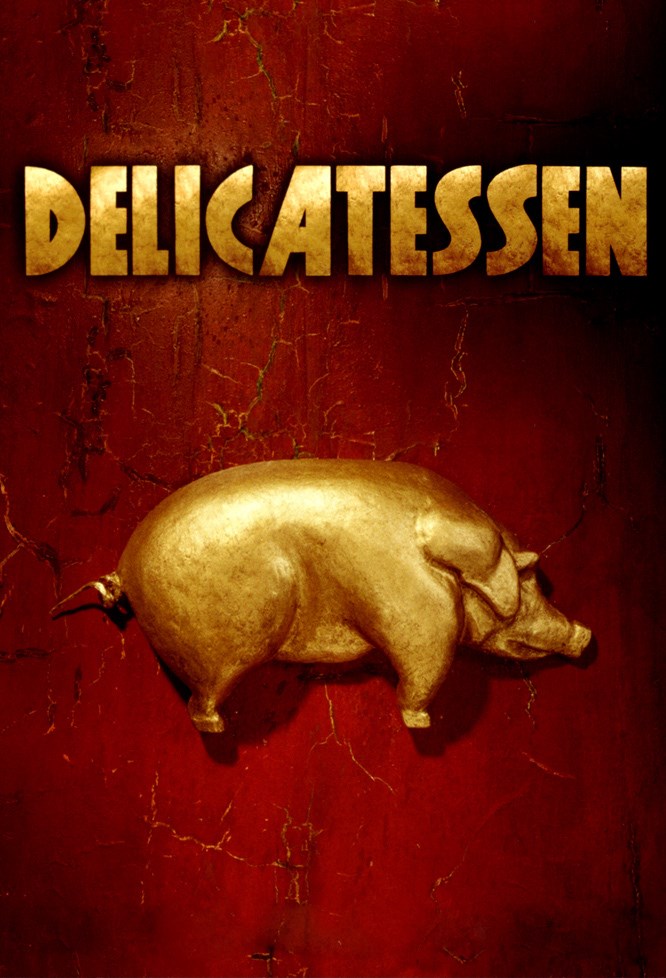Delicatessen is a 1991 French post-apocalyptic science fiction black comedy film directed by Jean-Pierre Jeunet and Marc Caro, starring Dominique Pinon and Marie-Laure Dougnac. It was released in North America as “presented by Terry Gilliam.”
In the realm of cinema, few films manage to blend dark humor, post-apocalyptic settings, and a peculiar charm quite like “Delicatessen.” Released in 1991, this French film, directed by Jean-Pierre Jeunet and Marc Caro, stands as a unique testament to the power of imaginative storytelling and visual artistry.

Directors: Jean-Pierre Jeunet and Marc Caro
The film’s directors, Jean-Pierre Jeunet and Marc Caro, are renowned for their distinctive visual styles and quirky narrative approaches. Jeunet, who later directed acclaimed films like “Amélie” and “A Very Long Engagement,” brought his whimsical and vibrant visual style to “Delicatessen.”
Marc Caro, known for his work in design and animation, complemented Jeunet’s vision with his dark, surrealistic touch.
The synergy between these two directors resulted in a film that is both visually striking and emotionally engaging.
Genre: A Blend of Dark Comedy, Romance, and Post-Apocalyptic Fantasy
“Delicatessen” is a genre-defying film. At its core, it’s a dark comedy, rich with absurd and macabre humor. Yet, it transcends this label, weaving in elements of romance, fantasy, and post-apocalyptic drama.
he film is set in a dystopian world where food is scarce, and people go to great lengths to procure whatever sustenance they can.
This grim setting is juxtaposed with a quirky and humorous tone, creating a unique cinematic experience that is both unsettling and endearing.

The Storyline
In a dilapidated apartment building in post-apocalyptic France, food is in short supply and grain is used as currency. On the ground floor is a butcher’s shop, run by the landlord, Clapet, who posts job opportunities in the newspaper to lure victims to the building, whom he murders and butchers as a cheap source of meat to sell to his tenants.
Following the murder of the last worker, unemployed circus clown Louison applies for the vacant position. Louison proves to be a superb worker with a spectacular trick knife, and the butcher is reluctant to kill him too quickly.
During Louison’s routine maintenance, he acquires a package dropped by a mailman. Louison delivers the package to Clapet’s daughter, Julie, who says the package contains confections and invites him to join her that evening.
Louison and Julie’s relationship blossoms into romance. At the same time, several of the tenants fall under Louison’s boyish charms, worrying others who are more anxious for their own safety should they require meat.

Clapet tells apartment tenant Marcel Tapioca that his rent is late and he must give up his mother-in-law as payment. That evening, Julie begs her father to let Louison go, knowing that Clapet is killing tenants for meat.
She goes to her apartment, unwraps a newspaper in her refrigerator and sees an article about the Troglodistes, a group of vegetarian rebels who live underground.
Julie descends into the sewers to make contact with the feared Troglodistes, whom she persuades to help rescue Louison.
Following the apparent butchering of Tapioca’s mother-in-law, the Troglodistes go through the sewer pipes and attempt to capture Louison, but end up mistakenly capturing tenant Mademoiselle Plusse instead.
Meanwhile, as Julie and Louison watch television, Clapet ascends to the roof, shaking the television antenna to lure Louison into going up to fix it.
Attacking Louison with a cleaver, Clapet’s attempt to kill him is foiled by an unexpected electrical explosion in one of the apartments.

Clapet, along with some tenants, storms Louison’s room in another attempt to murder him.
Louison and Julie take refuge in a bathroom and flood it, floor to ceiling, until Clapet opens the door, releasing the flood and washing the attackers away. Mademoiselle Plusse escapes the sewers, finds Louison’s boomerang knife, and gives it to Clapet.
Clapet throws the knife towards Louison, but inadvertently kills himself.
Louison and Julie play music together on the roof of the now peaceful apartment building.
Cinematography and Artistic Style
“Delicatessen” is a visual feast. The film’s cinematography is characterized by its use of sepia tones, which gives it a timeless, almost dreamlike quality.
The use of lighting and shadows plays a crucial role in creating the moody, eerie atmosphere that pervades the film.
The directors’ attention to detail in the set design is remarkable, with each element meticulously crafted to contribute to the film’s otherworldly feel.

Themes and Symbolism
The film explores themes of survival, human nature, and love in a world gone mad. The scarcity of food and the lengths to which people will go to obtain it serve as a metaphor for the human condition and our primal instincts.
The budding romance between Louison and Julie offers a glimmer of hope and humanity in an otherwise bleak environment.
This contrast between the dark aspects of human nature and the capacity for love and kindness lies at the heart of the film.
Reception and Legacy
Upon its release, “Delicatessen” received critical acclaim for its originality, artistic direction, and clever blend of genres.
It won several awards and cemented Jeunet and Caro’s reputations as innovative filmmakers. The film has since gained a cult following, cherished for its unique vision and its ability to elicit both laughter and thought.

Conclusion
“Delicatessen” is more than just a film; it’s a cinematic experience that defies conventional classification. Its blend of dark humor, romance, and post-apocalyptic fantasy, combined with the extraordinary vision of Jeunet and Caro, makes it a standout piece in the world of film.
It challenges viewers to find beauty and humor in the most unlikely places, making it a timeless piece that continues to captivate and amuse audiences decades after its release.


 Telegram
Telegram
 Facebook
Facebook